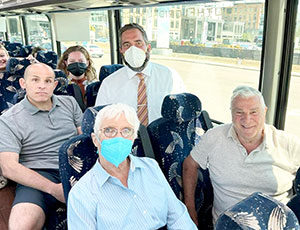
Reps. Ultrino, Connolly, and Donato on a trip to see how the Orange Line shuttle would work. I’ve taken the Green Line shuttle to work since.
(The opinions and views expressed in the commentaries and letters to the Editor of The Somerville Times belong solely to the authors and do not reflect the views or opinions of The Somerville Times, its staff or publishers)
By State Senator Pat Jehlen
People are furious at the state of the MBTA: the fatality, the fire, the explosion, the derailments, the injuries, the delays, the actual and proposed cuts in service, the month-long closure of the Orange and Green Line.
In 2009, two reports looked at Gov. Cellucci’s 1999 Forward Funding plan, which was developed with his Administration and Finance Secretary Charlie Baker. That plan dedicated 1% of the sales tax to the T, and also transferred over $3 billion in debt from the general fund to the T.
The D’Alessandro Report, requested by Gov. Patrick, found that the T was underfunded because “the Finance Plan substantially underestimated the system’s cost drivers.”
“Born Broke,” a report for the T Advisory Board, added that sales tax revenue had been growing less than 1% a year, failing completely as the T’s principal source of money. It reiterated the “corrosive effect” of the debt.
Under Gov. Patrick, who took office in 2007, the legislature added $160 million a year to help with the debt, and fares were increased. Patrick appointed Beverly Scott, who had 30 years of experience in public transit management, as general manager in December 2012. She said the T needed “significant reinvestment,” while Transportation Secretary Richard Davey added that “the T would spend more on debt service than on salaries” that year.
In 2013 Patrick proposed a major increase in transportation funding, based on The legislature passed a smaller, $800 million, tax package, which was further reduced after public pushback against a tax on software. And then, on a ballot question, taxpayers rejected the provision that indexed the gas tax to inflation, further reducing available funds. Evan Horowitz wrote a good summary of those revenue proposals.
Gov. Baker took office in January 2015 and immediately faced a shutdown of the T as nine feet of snow fell during February. Under criticism and pressure from Baker, General Manager Scott resigned, while continuing to assert the need for more investment.
Baker appointed an expert panel to recommend improvements to the T. Their Action Plan, issued in April 2015, said “it rejects the ‘reform vs. revenue’ debate because the T needs both.” However, Baker claimed that the problem was only with management: “What they did not say is that the T was underfunded. It wasn’t. It isn’t. It won’t be. What it was was poorly led and horribly managed.”
A safety review panel appointed by the Fiscal Management Control Board reported in 2019 that “since 2010 there have been 9 new GMs…the lack of trust with leadership was by far one of the most cited issues. When it comes to safety, employees felt that the organization has created a blame and retaliation culture.” 5 of the new GMs had been appointed – one of them twice – in Baker’s 4 years.
The FTA said in its August report that, since the 2019 Safety Review Panel report, safety performance has declined.
This brings us to 2022, with the Federal Transit Authority announced its safety investigation, leading to shutdowns and service reductions while the T does maintenance and tries to hire dispatchers and operators. We’re all following those stories closely, and I’ll write a little more about that soon. Meanwhile, I’m posting on Facebook about some of what I’m doing, including riding the shuttles to see how they’re working.
The T just doesn’t have either adequate funding or adequate management. They’re related: Adequate funding will depend on management – including the governor – telling the truth about how much money they need. And people – including the governor and all of us citizens – need to be willing to pay for it.
We’ll have a chance in November to decide whether people who make more than a million dollars a year to pay a little more for transportation and education. The Fair Share Amendment is our best chance to raise more revenue and say that safety, public transit, education, and our future are worth paying for. Don’t take it for granted!















Reader Comments